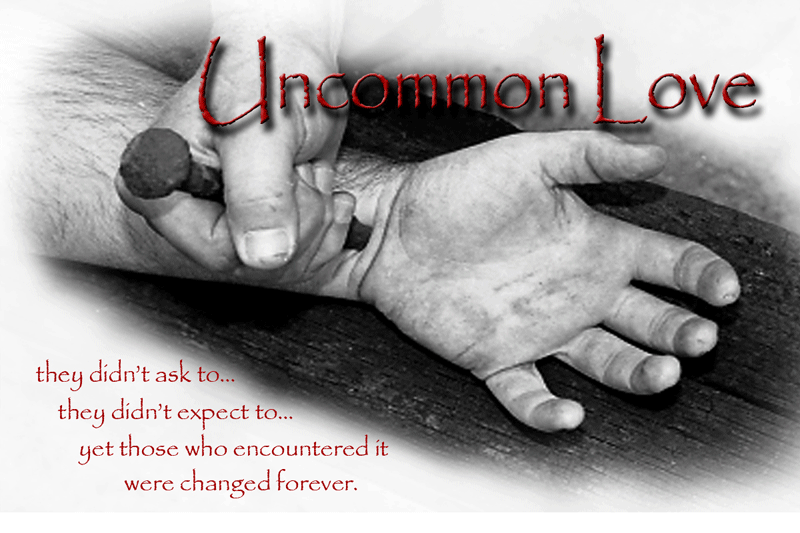 A man in love doesn’t always seem logical. He knew he loved her – more than he loved his own life. As he awaited the day of their wedding, he knew he would give anything for her. She was in his thoughts from the first moment he awoke until the last thought slipped into the darkness of sleep. He couldn’t get her out of his mind…her soft smile…her pleasing voice. He couldn’t imagine anything he wanted more than spending time with her. It was an added blessing that his father loved her, and knew she was perfect for him. When it came time to protect her, he saw his life as nothing compared to hers. He was ready to give his life, and when the time came, he did. The dark man came out of nowhere, but he came to steal, rape and destroy. He didn’t hesitate. Though not yet at the altar of marriage, he knew the way to save her life was to sacrifice his own. There was no doubt in his mind it was the right thing to do – so he did.
A man in love doesn’t always seem logical. He knew he loved her – more than he loved his own life. As he awaited the day of their wedding, he knew he would give anything for her. She was in his thoughts from the first moment he awoke until the last thought slipped into the darkness of sleep. He couldn’t get her out of his mind…her soft smile…her pleasing voice. He couldn’t imagine anything he wanted more than spending time with her. It was an added blessing that his father loved her, and knew she was perfect for him. When it came time to protect her, he saw his life as nothing compared to hers. He was ready to give his life, and when the time came, he did. The dark man came out of nowhere, but he came to steal, rape and destroy. He didn’t hesitate. Though not yet at the altar of marriage, he knew the way to save her life was to sacrifice his own. There was no doubt in his mind it was the right thing to do – so he did.
The story you just heard wasn’t about a wild-eyed couple on a walk through a park in the night – it was another retelling of the story of Jesus and His love for His church, a motley band of people rescued from brokenness. You see, the world sees the church as an institution – in the same childlike way a son or daughter sees their mother or father. To most children, mom is not a person as much as she is a resource, a housekeeper, an ever ready servant, a provider, a means to get nourishment, clean clothing and a safe, warm bed. Most think little of her feelings, and don’t really yet see her as a complete person – only as what she does for them. They are children, and that is the way simplicity sees complexity. In that same flattened state, the lost world sees God’s church as an organization that does (we hope) some good in the community. They see it as buildings, budgets, gatherings, publishing houses, soup kitchens, sponsors of schools, seminaries, hospitals and orphanages. They see what the church DOES – not what she is. She is a bride awaiting her Bridegroom. He loves her, and He has given all He has to her.
The world’s view may be immature, but that is really fine. The real problem is that many of the church don’t understand what she is to Jesus. He LOVED her and GAVE HIMSELF for her – according to Ephesians 5. He sees her worth when she doesn’t believe it about herself. I believe in the church – but not because of what it DOES, rather because my Savior believes in what He is doing in her. His is an optimistic and uncommon love. I must admit I didn’t see it at first, and I further concede that many of my fellow believers don’t really get His love for His church very well.
I have watched people hop around from place to place, with little regard for how that affects the body of believers. I have noted a number that criticize freely every aspect of what the church does – especially when they aren’t involved in the working of it. It’s easy to criticize the bucket brigade’s spillage when you are sitting under a tree as an observer. Bench warmers invariably become critics. Yet, Paul speaks of the church as something God loves.
Let me be very open with you. This teaching is offered by a Pastor, so to some it may sound self-serving – that is not my intention. This is a call from Paul’s letter to Corinth to open up and see the church the way Jesus sees it.
Key Principle: We must remember how the Savior responds to casual disdain for His church.
For a brief moment, remember where Paul has journeyed in the letter so far. In chapter one, we saw four reasons that church bodies divide that were NOT good reasons:
• They had confused the STANDARD of truth – the Eternal Word of God properly and carefully interpreted.
• They confused the CENTRAL TRUTH of the church – the work and Word of Jesus our Lord.
• They confused the importance of the WORKER with the importance of the transforming work of God’s Spirit.
• They confused POPULAR thinking for RIGHT thinking. There are many ways to get people to respond emotionally that are not spiritually sound approaches.
Yet, the fact that churches get it wrong and divide doesn’t make God walk away – and we shouldn’t either. Keep looking, a chapter two reminds us the church is unique, and needs to be considered different that the world’s conventions and structures.
We noted:
1. Our MESSAGE should drive methods in the church – not the other way around.
2. PERSONALITIES need to remain in the background, with Jesus placed in front.
3. We must not DUMB DOWN – trying to require very little of the hearers of the Word.
4. God’s Word must be TAUGHT but never adjusted to embrace the desires of a lost world – no matter how that sounds to them.
By chapter three, Paul turned back to the Corinthian division issue with a new approach: People criticize, mock and play with the Church of Jesus Christ because they do not truly comprehend how God feels about their casual attitude toward His “bride to be”.
To really grasp the TRUTH of God’s church:
We need a different kind of DISCERNMENT:
1 Corinthians 3:1 And I, brethren, could not speak to you as to spiritual men, but as to men of flesh, as to infants in Christ.
God’s truth is spiritually discerned, and the Spirit’s work is based on surrender. Un-surrendered Christians are selfish and flesh-oriented Christians – and we ALL have been that at one time or another. When we are, our comprehension of God’s meaning is diminished, as He pulls back. In that state we trade the ability to really grasp the things of the Spirit for our hunger in this physical world. Believers in Corinth did so, and Paul couldn’t take them to a higher level while they balked in the level they were already on.
We need different APPETITES:
1 Corinthians 3:2 I gave you milk to drink, not solid food; for you were not yet able to receive it. Indeed, even now you are not yet able, 3 for you are still fleshly….
The problem with continually disobedient believers isn’t usually that God’s Word hasn’t been taught to them – but that they have refused to grow out of personal resistance and they cannot endure the tough truth of surrender. Where does it often first show? In attitude and relationship – in personal deportment and strife with others:
1 Corinthians 3:3b “…For since there is jealousy and strife among you, are you not fleshly, and are you not walking like mere men? 4 For when one says, “I am of Paul,” and another, “I am of Apollos,” are you not mere men?
One obvious manifestation of selfishness and willful rebellion toward God is the inability to get along with one another. Unity comes from surrender, and rebellion leads to division. When we truly all kneel before the Cross, we find a friend kneeling beside. When we look at what Jesus did for OUR SIN, we don’t puff ourselves up – because we see the light of God’s goodness in stark contrast to our own former darkness. Paul called lost men “mere men” for they had no sense of spiritual things. Divided people are living earth centered lives, not Heaven centered ones.
As the Apostle James said, battles between us come from battles within us. Refusing to be healed by God will eventually spill over into wounds we will give another – it is inevitable. Either I can take my wounds to the Cross and have them healed there – or I will wound others with my stubborn and failed self-reliance. This church was divided, because people in this church refused to grow up in Christ and yield to Him. Many a church conflict can be summarized in that same way.
We need to new DEFINITIONS:
The world doesn’t define words the way God does, and the church must resist defining them according to the world. Paul wrote:
1 Corinthians 3:5 What then is Apollos? And what is Paul? Servants through whom you believed, even as the Lord gave opportunity to each one. 6 I planted, Apollos watered, but God was causing the growth. 7 So then neither the one who plants nor the one who waters is anything, but God who causes the growth. 8 Now he who plants and he who waters are one; but each will receive his own reward according to his own labor. 9 For we are God’s fellow workers; you are God’s field, God’s building.
The world called Paul a LEADER, but God called him a SERVANT. We need to re-work a flawed definition of leadership given to us by a world that believes the term means DOMINATION. The Bible teaches leadership is influence of an intentional SERVANT. Don’t misunderstand… Paul had a proper and healthy self-image. He knew he was one that Jesus gave His precious blood to save – so he did not feel worthless. At the same time, he did not inflate himself with visions that his gifts made him more valuable than others with other gifts. He saw himself as we should see ourselves – those who serve Jesus by serving one another. He saw himself as one who labored alongside others who had differing roles – but the same goal – to be used by God to honor Him through the growth of His kingdom.
When he said that “neither the planter nor the water bearer were anything” – he meant ANYTHING APART FROM THE PURPOSE FOR WHICH WERE CREATED. Our work means something, but only because it reflects our Savior Who means EVERYTHING. God may use us, but could just as easily use another. We are not indispensable, irreplaceable or the key to the future of the Kingdom – Jesus is. Following a man is fine if he is following Christ. If not, he is leading you away from God’s direction – because Christ is always on the right path.
Paul finished the argument with a simple acknowledgement that both the planter and the water bearer were on the SAME TEAM and therefore must not be the rallying point for separation. People who serve Jesus well aren’t pulling people to THEM – but they are pulling people to JESUS. At the same time, they are excited when a person is following Jesus well even if they are being led by another godly person. Competition in churches is often an ego battle of immature people masquerading as godly leaders. We must be MORE and MORE careful to uphold our brothers in Christ – to speak well or simply refuse to speak at all. My brothers in ministry deserve my love, encouragement and help – with as little criticism as I can possibly offer. The exception to that is when someone wants to deliberately corrupt the truth of the Gospel – but that, in my experience, is quite rare. It happens, but not nearly as much as gossip and criticism about other men of the Word occurs – sadly.
I love that Paul saw the people of the church at Corinth to be a field of labor and a building that was under construction. He KNEW that working with people was neither easy nor short term. Agriculture is about endurance, construction about planning – both are essential in a longer view of ministry. We need to be careful to always build sustainable ministry. If we start something, we need to look at how it can continue – or we should question why we spend our energies in that way. Short term thinking isn’t the right approach to real ministry with people.
We need a better MEMORY:
We must remember the appropriate JUDGE of the church is the Bridegroom that is betrothed to her:
1 Corinthians 3:10 According to the grace of God which was given to me, like a wise master builder I laid a foundation, and another is building on it. But each man must be careful how he builds on it. 11 For no man can lay a foundation other than the one which is laid, which is Jesus Christ. 12 Now if any man builds on the foundation with gold, silver, precious stones, wood, hay, straw, 13 each man’s work will become evident; for the day will show it because it is to be revealed with fire, and the fire itself will test the quality of each man’s work.
In a moment of self-reflection, Paul recognized that God’s grace was the operative power behind his accomplishments in ministry. Who among us can say differently? He recognized that he was in need of a constant flow of grace from the time of his salvation through the whole process of honoring God in ministry. He also openly acknowledged the difference between a good plan for establishing a ministry, and a BAD plan. He said he was a WISE master builder when he placed the foundation stones. Others built upon his work, but Paul outlined the whole building with a foundation of Jesus Christ.
When Paul said there was “no other foundation” he was indicating that there was no other PROPER foundation. Men build ministry on many things that are not Christ and His work.
Look around. You will find denominations building on the foundation of SATURDAY as the day of worship. You will see others building on the foundation of a FOUNDING TEACHER. You will find others that are building on the KING JAMES BIBLE, or some other version of the same argument. The foundation must be the Person and work of Jesus the Messiah as the One Who brought justification and replaced atonement.
Back in 1923, nearly one hundred years ago, a leadership of the Presbyterian church called the General Assembly desperately tried to hold the church back from embracing the rising modernist and relativist waves. The drafted “Five Fundamentals of the Faith” in order to make clear what orthodoxy was, as well as seeking every candidate seeking to be ordained in the Presbyterian Church to affirm and align with their historic positions. These five were:
• Inerrancy of the Scriptures
• The virgin birth (and the deity of Jesus)
• The doctrine of substitutionary atonement
• The bodily resurrection of Jesus
• The authenticity of Christ’s miracles
In response, a number of well-known seminary professors of the time constructed the Auburn Affirmation. In it they outlined that:
• The Bible was not without error, and individual conscience led by God should determine what was true and what was not.
• None of the five “fundamentals” should be considered essential to ordaining men for ministry.
• There were other valid alternative theories to the meaning of Jesus’ work – Jesus didn’t necessarily come to save sinners in a substitutionary way.
Having set aside the Word and its claims on the Person and work of Jesus as a requirement, they defined a liberal Christian base that has all but killed the churches that embraced it. If you look for where churches are dying en mass, you will find them among the churches that have been reduced to saying much that is not mimicking the culture. The numbers among the “born again” church ranks are growing – while main line denominational churches are sinking fast. Why? Because the storm of culture hit the structure of a church not attached to the right foundation.
Some churches build on EGO (believing that only their denomination alone can bring the truth), others on FAME (using methods that draw crowds by their stunning approach, but are not directed by the Spirit of God). These may result in churches, but at their core they are not about knowing and serving Jesus Christ. The day will come when that will be clear – either at the judgment seat of Christ, or even before that time.
1 Corinthians 3:14 If any man’s work which he has built on it remains, he will receive a reward. 15 If any man’s work is burned up, he will suffer loss; but he himself will be saved, yet so as through fire.
The real test of ministry is not its temporal popularity, but its spiritual endurance at the scrutiny of the Master. If Jesus doesn’t deem it correct and healthy – than it simply isn’t – no matter how much an earthly sensation it appeared to be. Heaven isn’t a place where a vote will be cast by the members of a theological academy or angelic choir. We serve a committee of ONE – a Master Who will inspect all of the work that we have done. There is NO OTHER treasure higher than HIS SATISFACTION. At the same time, His satisfaction is often paired by the satisfaction of other godly men and women. People who have a healthy walk with God can “sniff out” teaching and leadership that is healthy – because we have the selfsame Spirit within.
Someday Jesus will take all of my labor and place it between us. He and I will look at the number of hours I have labored to know and teach His Word. We will look at the way I communicated that Word to people. He will examine the time I have spent caring for people – and He will give the TRUE and PERFECT evaluation of me. If I have done well in His estimation – the trial of my work before His fiery eyes of scrutiny will survive. If I have not done well – that work will evaporate – with no opportunity to relive my life on earth.
When I stand before Jesus – seconds, minutes, hours, days, weeks, months and years will evaporate into the smoke as the fire of His eyes burn through my life’s work. What is left after all the selfish, ego-driven, stubborn, hard-hearted, gossip-laden, flesh colored work is gone – is what Jesus can BEGIN to celebrate. Mature believers keep that day in their minds eye – and never lose sight of it. Brethren, some of us seem to be content wasting our only opportunity to please Him!
Before we move on, it is worth asking: “What does it mean for a believer to “SUFFER LOSS”?” In the text it is clear that there is no issue of salvation or eternal destiny at stake in the argument – this is a judgment in the life of a believer. Everyone is judged TWICE by God – once for sin, and once for performance of work. The sin judgment determines one’s destiny. The performance judgment, measured strictly against what God has made us capable to complete – is about REWARD. Heaven is the HOME of the believer – but some level of REWARD before the Savior is a conditional blessing to those who live their lives for His glory. Beloved, I fear that many of us spend much of our lives on ourselves, and not on His honor and glory – can that be? May we see it now and avoid the sadness of loss later…
We need a new GRASP:
We need to recognize GOD’S COMMITMENT to the church is not something fleeting or small:
1 Corinthians 3:16 Do you not know that you are a temple of God and that the Spirit of God dwells in you? 17 If any man destroys the temple of God, God will destroy him, for the temple of God is holy, and that is what you are.
God doesn’t use the term TEMPLE to mean church very often, but here is an exception. It is clear in the passage that God wanted men to understand that the church of Jesus Christ is not just another organization to be criticized, gossiped about, and slammed at will. This organism is a living body created by a Victorious Savior. It has His fingerprints, His DNA and was founded on His blood. It not only COST Him plenty to create, it was created with a God ordained DEFENSE system. Criticize it lightly, and God will censure your life’s work easily. Be careful, when you speak of the church… you speak of GOD’S CHURCH.
• Did not God’s church reach into the sin sick lives of men and women of the Roman Empire at the expense of being thrown to lions, being crucified or beheaded? It was NOT to win a theological argument – for the early Christians were really trying to offer hope to hopeless people.
• Did not God’s church reach the poor in many nations long before ever being considered by the rich among them? It was not to become WEALTHY – for even today there are many who handle the broken in skid row and hungry in India’s streets for no other reason than to show their love for and obedience to their Savior.
• Did not God’s church begin some of the great universities of our world? It was not to become ERUDITE – for though they shudder at the idea, the great schools of Princeton and Yale were begun to train men to share Jesus and His Word with accuracy and scholarship.
• Did not God’s church open hospitals in many cities of our world? It was not to gain control of health care legislation – but because they saw the sick as needy and the needy as open to Christ.
• Did not God’s church feed the poor in many places, offer addiction counseling and group meetings, help single parents with support, care for elderly and widows? Yes, sure it has… and it is just beginning its work. There is much MORE to do. We have not been perfect, but we have not been FILLED WITH EMPTY WORDS EITHER – there is a track record and a history… and it isn’t all bad no matter what you have heard.
Where we have failed, we will seek to have God renew us. Where we have resisted, we will learn to submit to the Gentle Chief Shepherd…. But know this… this is God’s church in many places, under many names – and He has promised to be her defense when she is attacked – so tread lightly. Hold back quick words about the intent of others –even if their denomination or fellowship doesn’t completely agree with yours.
We live in a polarized America – and it is affecting even the church. Never have so many believed so much the same thing and disagreed on so little – but made such a big deal about it. We cannot afford to criticize freely what God loves greatly and paid for richly.
1 Corinthians 3:18 Let no man deceive himself. If any man among you thinks that he is wise in this age, he must become foolish, so that he may become wise. 19 For the wisdom of this world is foolishness before God. For it is written, “He is THE ONE WHO CATCHES THE WISE IN THEIR CRAFTINESS”; 20 and again, “THE LORD KNOWS THE REASONINGS of the wise, THAT THEY ARE USELESS.” 21 So then let no one boast in men. For all things belong to you, 22 whether Paul or Apollos or Cephas or the world or life or death or things present or things to come; all things belong to you, 23 and you belong to Christ; and Christ belongs to God.
Great men and women of God think differently. They are made from a different stuff and cut from a different cloth – and God loves it that way. One who comes to Christ is made alive from death. He must learn to speak of the Spirit. He must learn to share in unity. He must learn to love and laugh and joy with the body… He does not know for his past – for he was dead.
Paul concluded the section in a simple and straightforward way – STOP BOASTING IN MEN. Don’t divide along party lines based on personalities – STOP. Men may be helpful and gifted, but they aren’t Divine. They may possess the Spirit – but they AREN’T the Spirit. Men are just lumps of clay empowered by a Good God. They are not to be abused, but nor are they to be revered in themselves.
His big finish is a bit strange. He repeated twice that “all things belong to you”. I suspect this refers to a specific part of what people were saying about the movements based on individuals at Corinth– specifically that those who followed a more GIFTED LEADER had some special measure of God’s sanction and God’s honor. Watch out for believers that try to convince you their group has something more than you have by following Jesus.
Watch your criticism of Jesus’ bride – He takes it all quite personally! I suspect this text was given to us because so few comprehend how Jesus feels about our casual attitude toward His betrothed. He loves His bride, and that includes all who know Him. Don’t forget! The body makes the difference…
In 1857, there was a 46 year old man named Jeremiah Lamphere who lived in New York City. Jeremiah loved the Lord tremendously, but he didn’t feel that he could do much for the Lord until he began to feel a burden for the lost and accepted an invitation from his church to be an inner city missionary. So in July of 1857 he started walking up and down the streets of New York passing out tracts and talking to people about Jesus, but he wasn’t having any success. Then God put it on his heart to try prayer. So he printed up a bunch of tracts, and he passed them out to anyone and everyone met. He invited anyone who wanted to come to the 3rd floor of the Old North Dutch Reform Church on Fulton St. in New York City from 12 to 1 on Wednesday to pray. He passed out hundreds and hundreds of fliers and put up posters everywhere he could. Wednesday came and at noon nobody showed up. So Jeremiah got on his knees and started praying. For 30 minutes he prayed by himself when finally five other people walked in. The next week 20 people came. The next week between 30 and 40 people came. They then decided to meet every day from 12:00 to 1:00 to pray for the city. Before long a few ministers started coming and they said, “We need to start this at our churches.” Within six months there were over 5000 prayer groups meeting everyday in N.Y. Soon the word spread all over the country. Prayer meetings were started in Philadelphia, Detroit, and Washington D.C. In fact President Franklin Pierce started going almost every day to a noonday prayer meeting. By 1859 some 15,000 cities in America were having downtown prayer meetings every day at noon, and thousands were brought to Christ. The great thing about this revival is that there is not a famous preacher associated with it. It was all started by one man wanting to pray. – (Sermon Central, From a sermon by Rich Anderson, Seeking The Face Of Jesus Christ 2/18/2011).


















